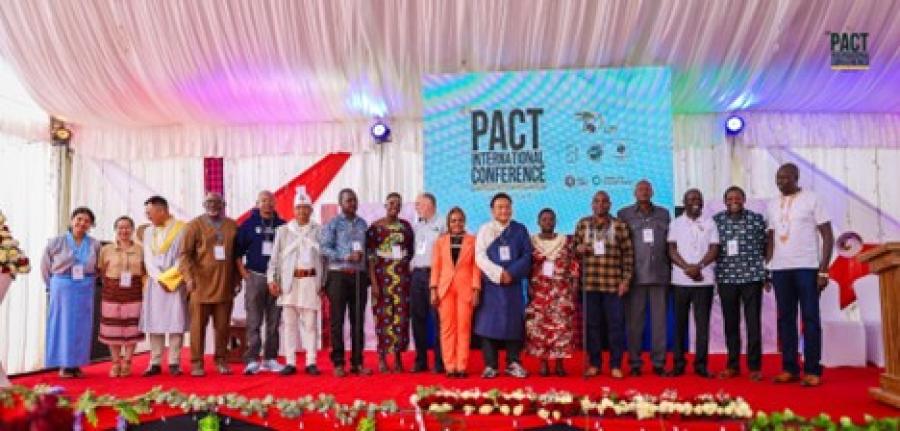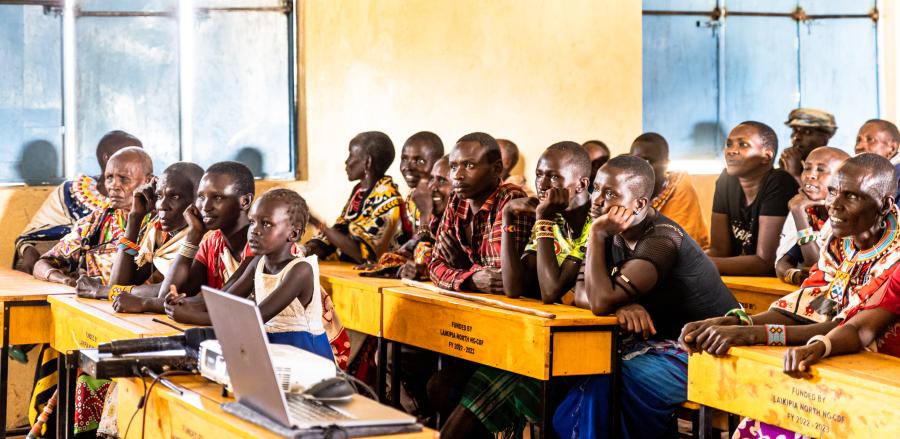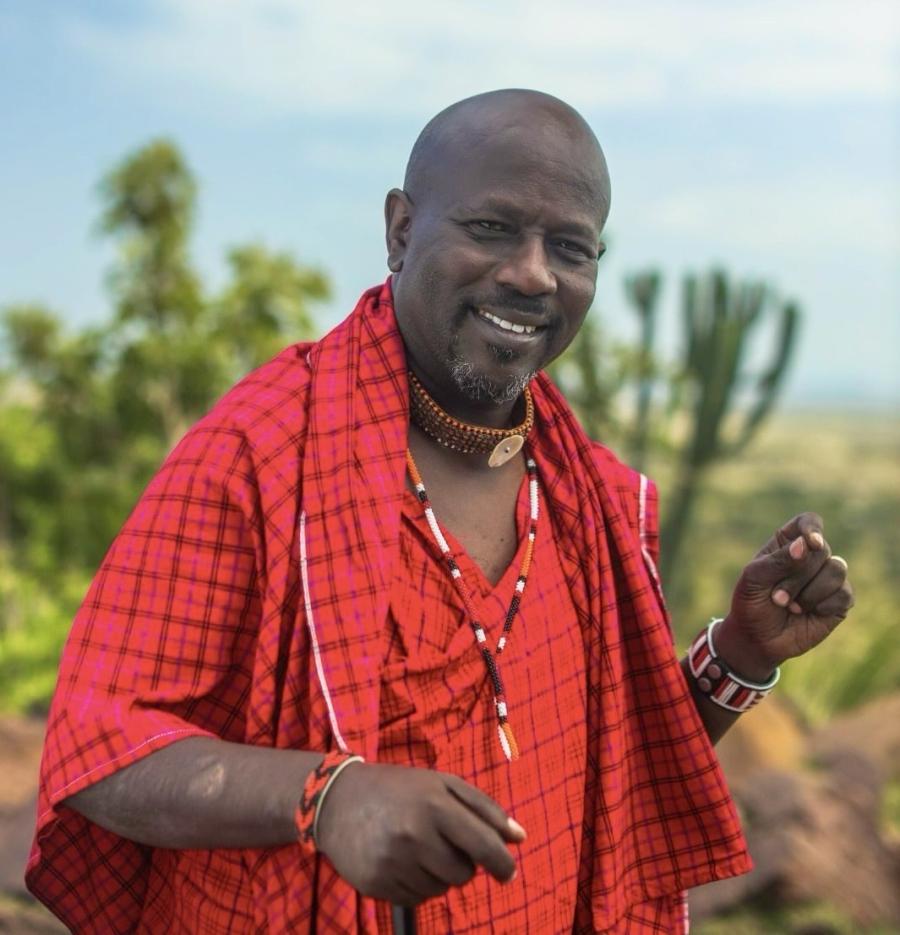Mama Kenyatta is a respected local elder and women's leader among the Turkana people of Isiolo, in central Kenya. Founder of an all-Turkana women's group in 1992, Mama Kenyatta works for the self-improvement of local women and families and for pride in Turkana cultural heritage and traditions. One of her grave concerns, besides constantly making ends meet, is that the young are losing the knowledge, awareness, and language of their people. Mama Kenyatta uses the women's group to pass on cultural values and practices of the Turkana to younger women amid a rapidly changing world.
Like other pastoralist groups throughout East Africa, the Turkana face increasing pressures to migrate from their ancestral homelands around Lake Turkana and settle into a largely alien agricultural life. These pressures make them subordinates to other ethnic groups that have long been in control of agricultural lands and expose the Turkana to new influences, languages, and cultures in the urban centers to which they are drawn.
These new influences have rapidly pervaded Turkana life, destabilized traditional relations, and caused young Turkana people to lose touch with their heritage. This is why Mama Kenyatta has made her women's group a focal point for Turkana pride and cultural celebration in Isiolo. Her efforts speak to an age-old problem: how can people maintain their traditions amid the powerful effects of urbanization, exploitation, and new life circumstances?
A Recently Landed People
Isiolo is the quintessential frontier town. Situated at the edge of the great Northern Desert, it is the `last chance' of Kenya's central highlands. Only 35 kilometers northwest of the lush, verdant Meru town, Isiolo sits astride the northbound tarmac atop a hot, semiarid, windswept plain. With a large population of Somali, Boran, and Turkana settlers and a gleaming white mosque signaling the predominance of Islam, Isiolo is worlds apart from largely Christian Meru town to the south, where Bantu-speaking people cultivate tea and coffee on the rich, gentle slopes of Kirinyaga (Mt. Kenya). In Isiolo, only irrigation schemes stand between meager crops and a harsh desert.
Turkana people are caught in the complex history of land use in the Isiolo region. As in many other regions of Kenya, Isiolo land has been distributed within networks of patronage and exploitation. The principal landowners of the district are Meru and Kikuyu settler families who left their own overcrowded home areas for better prospects. Though predominant in the central highlands to the south, the Meru and Kikuyu people of Isiolo are a minority made wealthy by their political and economic ties with the towns and government offices of the highlands. Along with a few Somali families, Meru and Kikuyu business people have also monopolized the trading, merchandising, and real estate sectors of the region.
The poorest groups, such as the Turkana, are effectively barred from these more lucrative sectors of the region's economy. For them, smallscale farming on parched, alkaline soil is the primary source of livelihood. Their struggle is compounded by the fact that they have no agricultural tradition. Only one or two generations ago, most families like Mama Kenyatta's had plied their livelihood from pasturing cattle. Successive wars, droughts, famines, and the enclosure of pastoral lands by the government have forced many of the Turkana to migrate from their ancestral homes around the vast jade expanse of Lake Turkana in the very north of Kenya. In their new homes to the south, they have found land to be tightly constrained and controlled by the well-connected Meru and Kikuyu families. The Turkana eke out a living through sharecropper-like arrangements, working Meru and Kikuyu lands for a pittance. While many own at least some small plots of land, nearly all of the Isiolo Turkana supplement their paltry returns with day labor on large Kikuyu and Meru farms. It is in this context that Mama Kenyatta founded the first all-Turkana women's group in the Isiolo region.
Mama Kenyatta and Women's Groups
Women's groups in Kenya are made up of predominantly rural, Christian women from agriculturalist ethnic groups (see sidebar). There are very few pastoralist women's groups since pastoralists (Maasai, Samburu, Turkana) do not have a strong tradition of collective labor parties or mutual assistance organizing among women, unlike the Meru, Kikuyu, and Kamba of the fertile highlands. However, as pastoralist groups were settled in newly opened agricultural areas, they adapted certain practices of their Meru and Kikuyu neighbors who were often their patrons, landlords, and employers. Thus, this mixing of ethnicities and cross-cultural adaptation around towns such as Isiolo influenced traditionally pastoralist groups, such as the Turkana, to join women's groups founded by the Meru and Kikuyu women.
In 1983, Mama Kenyatta joined her first group called Muwere Women's Group. Like most women who join groups, Mama Kenyatta saw it as a chance to help herself and her family. This particular group was comprised of Meru and Turkana women, and conducted a `merry-goround' (see sidebar on p. 20) for purchasing goats for each member. Soon after she joined, however, she became aware of the inherent inequality between members based on their ethnic background. "The Meru women weren't doing anything," Mama Kenyatta recalls. "They `ate' everything and used up all the money for improvements on their own lands." Moreover, the group meetings were in Kiswahili, despite the fact that the Turkana women had very little knowledge of the language.
According to Mama Kenyatta, the Meru women had an educational advantage and connections to influential people in town. The Meru members were literate-many of them teachers. As Mama Kenyatta recalls, they exploited Turkana women's illiteracy and ignorance for their own gain, often not even bringing their own money into the merry-go-rounds. Mama Kenyatta told us that the Meru women would say Waturkana ni wajinga, meaning "the Turkana are stupid," to their faces.
Tired of being exploited and cheated, Mama Kenyatta decided to start an all-Turkana women's group in 1992 called Kitamaduni, meaning `cultural' in Swahili. Although Turkana women do not have a tradition of women's groups, Mama Kenyatta and others learned from first-hand experience how to run a group-and how not to run a group. Mama Kenyatta felt that there would be many advantages to an all-Turkana women's group; she explains that "Turkana women won't cheat each other and they can use their mother tongue for group meetings and discussions"-an important factor in accountability.
Just as important, however, was the role the group would play in revitalizing Turkana culture. Mama Kenyatta conceived the group as a place where knowledge of Turkana culture and language could be kept alive and passed on to younger women. Through their participation in the group, "the young women learn the Turkana songs, dances, crafts, traditions, and stories we learned from our parents. They are learning from the old women in the group," Mama Kenyatta explains. This is especially important to her, since living in such an ethnically mixed area has led to problems within the Turkana and has caused the young to lose their language and their culture.
The Kenyan education system and European religions are further sources of anxiety for the Turkana. Schools force students to leave their culture behind by teaching in English and Swahili. The education system is a crucial piece of the nation-building process, encouraging allegiance to the state and to a national civic culture. This nationalism is a principle value of the educated elite. But "Turkana culture has little to do with Kenya or Kenyan things" Mama Kenyatta explains. "Take our clothes for example. We once wore skins and beads only, and still go without shoes." But now she says they have been compelled to adapt so as not to offend their heavily Christianized and powerful Meru neighbors, who see `scant' clothing as rude, unrefined, and sinful. Likewise, Turkana children have had to take on alien languages while their own mother tongue is ridiculed by teachers and administrators who are themselves powerfully entrenched in the national culture.
For challenging the primacy of this nation-building culture, Mama Kenyatta is open to charges of tribalism. But such accusations are often a way to cover up the concerns of disempowered and marginalized ethnic groups and deflect their criticisms of national elites. Moreover, the false dichotomy such charges create between `national' and `tribal' obscures the extent to which the national culture is itself a particular, rather than universal culture with its own set of values and beliefs. Ethnic pride as manifested by Mama Kenyatta's group cannot be reduced to crude `tribalism'-often a code word among elites for ethnic insurgency. Rather, an allTurkana women's group must be regarded as a sign of social health, as a peaceful, non-violent solution to the obvious problems associated with nationalism and elite control of cultural resources. Kitamaduni women draw upon their own cultural resources for strength and community rejuvenation.
Kitamaduni and Cultural Survival
Thanks to Mama Kenyatta's determination over the past few years, Kitamaduni Women's Group has flourished. The group carries out a merry-goround for needed household supplies, provides collective farm labor for members, and sells beaded jewelry. Mama Kenyatta remains an important leader and advisor for the group, though she has conscientiously refused to serve as a group officer. Instead, she has encouraged younger women with some formal education and a knowledge of Swahili and English to take up these positions.
One gets the sense that Mama Kenyatta is training a set of leaders for the community's future, leaders who will have the tools to interact with the larger society, but who will retain a level of pride in, and attachment to their people. Thus, this all-Turkana women's group is at once a project for economic self-improvement, a vital hedge against the erosion of culture, and a training ground for future community leaders. Kitamaduni women's group is a highly creative innovation, mobilizing the collective strength of Turkana women within a format pioneered by their patrons and bosses. It is an important institution to keep their culture intact to pass down to Turkana youth, while shrewdly mobilizing community resources for the development of indigenous leadership.
Article copyright Cultural Survival, Inc.



